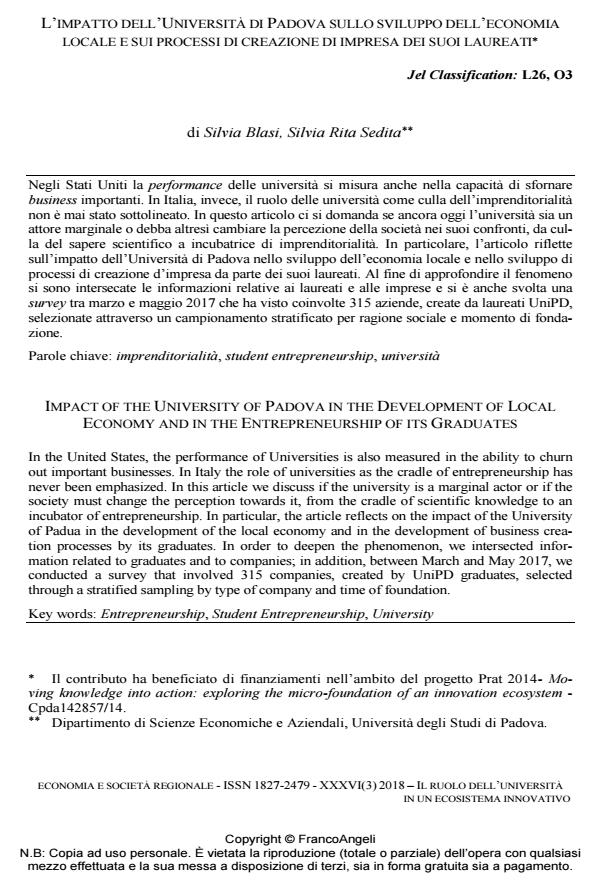L’impatto dell’università di padova sullo sviluppo dell’economia locale e sui processi di creazione di impresa dei suoi laureati
Titolo Rivista ECONOMIA E SOCIETÀ REGIONALE
Autori/Curatori Silvia Blasi, Silvia Rita Sedita
Anno di pubblicazione 2018 Fascicolo 2018/3
Lingua Italiano Numero pagine 14 P. 72-85 Dimensione file 501 KB
DOI 10.3280/ES2018-003007
Il DOI è il codice a barre della proprietà intellettuale: per saperne di più
clicca qui
Qui sotto puoi vedere in anteprima la prima pagina di questo articolo.
Se questo articolo ti interessa, lo puoi acquistare (e scaricare in formato pdf) seguendo le facili indicazioni per acquistare il download credit. Acquista Download Credits per scaricare questo Articolo in formato PDF

FrancoAngeli è membro della Publishers International Linking Association, Inc (PILA), associazione indipendente e non profit per facilitare (attraverso i servizi tecnologici implementati da CrossRef.org) l’accesso degli studiosi ai contenuti digitali nelle pubblicazioni professionali e scientifiche.
Negli Stati Uniti la performance delle università si misura anche nella capacità di sfornare business importanti. In Italia, invece, il ruolo delle università come culla dell’imprenditorialità non è mai stato sottolineato. In questo articolo ci si domanda se ancora oggi l’università sia un attore marginale o debba altresì cambiare la percezione della società nei suoi confronti, da culla del sapere scientifico a incubatrice di imprenditorialità. In particolare, l’articolo riflette sull’impatto dell’Università di Padova nello sviluppo dell’economia locale e nello sviluppo di processi di creazione d’impresa da parte dei suoi laureati. Al fine di approfondire il fenomeno si sono intersecate le informazioni relative ai laureati e alle imprese e si è anche svolta una survey tra marzo e maggio 2017 che ha visto coinvolte 315 aziende, create da laureati UniPD, selezionate attraverso un campionamento stratificato per ragione sociale e momento di fondazione.
Parole chiave:Imprenditorialità, student entrepreneurship, università
Jel codes:L26, O3
- Who benefits from university–industry collaboration for environmental sustainability? Eleonora Di Maria, Valentina De Marchi, Katharina Spraul, in International Journal of Sustainability in Higher Education /2019 pp.1022
DOI: 10.1108/IJSHE-10-2018-0172
Silvia Blasi, Silvia Rita Sedita, L’impatto dell’università di padova sullo sviluppo dell’economia locale e sui processi di creazione di impresa dei suoi laureati in "ECONOMIA E SOCIETÀ REGIONALE " 3/2018, pp 72-85, DOI: 10.3280/ES2018-003007